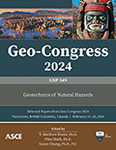Quantification of Resilience in Geotechnical Asset Management Applications
Publication: Geo-Congress 2024
ABSTRACT
With the emerging application of geotechnical asset management (GAM) and the increasing risks due to extreme events and the aging transportation infrastructure, resilience of geotechnical assets is a critical component that should be incorporated within GAM. In this paper, we introduce a quantitative risk-based approach to define and quantify resilience at individual geotechnical assets and the resilience of a network. The proposed general definition of resilience is the ability to anticipate and prepare for changing conditions and disruptive events to enable the asset or a system of assets to withstand and recover rapidly from disruptions (without failure) by restoring an acceptable level of service and condition in a specified time frame, which can be measured using observations and/or performance models. Following the discussion about the attributes encompassed in this definition, we introduce a holistic resilience assessment framework for geotechnical asset, focusing on its application within a GAM program.
Get full access to this article
View all available purchase options and get full access to this chapter.
REFERENCES
117th Congress. (2021). Bipartisan Infrastructure Law (BIL), Infrastructure Investment and Jobs Act, Sec. 11103 of the Public Law 117-58. Pub. L. 117-58.
Alhasan, A. A. (2021). “Investment Strategies under Uncertainty for Transportation Asset Management.” International Conference on Transportation and Development 2021, 133–144.
AASHTO. (2013). AASHTO transportation asset management guide: A focus on implementation. AASHTO.
Benoy, S., Vijayanarayanan, A. R., and Saravanan, M. (2023). “Paradigm shift to resilience based design for improved seismic behaviour–State-of-the-Art.” Materials Today: Proceedings, Elsevier.
Botello, L., and Domínguez, N. (2017). “Multi-scale modeling of urban regions in the framework of the Resilience-Based Design.” Proceedings of the 6th Structural Engineers World Congress, Cancun, Mexico.
Bruneau, M., Chang, S. E., Eguchi, R. T., Lee, G. C., O’Rourke, T. D., Reinhorn, A. M., Shinozuka, M., Tierney, K., Wallace, W. A., and Von Winterfeldt, D. (2003). “A framework to quantitatively assess and enhance the seismic resilience of communities.” Earthquake spectra, SAGE Publications Sage UK: London, England, 19(4), 733–752.
Cimellaro, G. P. (2013). “Resilience-based design (RBD) modelling of civil infrastructure to assess seismic hazards.” Handbook of seismic risk analysis and management of civil infrastructure systems, Elsevier, 268–303.
Holling, C. S. (1973). “Resilience and stability of ecological systems.” Annual review of ecology and systematics, Annual Reviews 4139 El Camino Way, PO Box 10139, Palo Alto, CA 94303-0139, USA, 4(1), 1–23.
Kolozvari, K., and Terzic, V. (2023). “Methodology for developing practical recovery-based design requirements for buildings.” Engineering Structures, Elsevier, 274, 115102.
Lee, M. (2016). Resilience assessment in geotechnical engineering. University of Waterloo.
Lee, M., and Basu, D. (2018). “An integrated approach for resilience and sustainability in geotechnical engineering.” Indian Geotechnical Journal, Springer, 48, 207–234.
Lim, M., Bassamboo, A., Chopra, S., and Daskin, M. (2011). Use of chaining strategies in the presence of disruption risks., University of Illinois Urbana–Champaign, Champaign.
Ouyang, M., Dueñas-Osorio, L., and Min, X. (2012). “A three-stage resilience analysis framework for urban infrastructure systems.” Structural safety, Elsevier, 36, 23–31.
Robbins, T., Chittoori, B., Gajurel, A., and Hamilton, R. (2018). “Unified approach to sustainability, resiliency and risk assessments.” IFCEE 2018, 537–546.
Serulle, N. U., Heaslip, K., Brady, B., Louisell, W. C., and Collura, J. (2011). “Resiliency of transportation network of Santo Domingo, Dominican Republic: case study.” Transportation research record, SAGE Publications Sage CA: Los Angeles, CA, 2234(1), 22–30.
Shah, J., Jefferson, I., and Hunt, D. (2014). “Resilience assessment for geotechnical infrastructure assets.” Infrastructure Asset Management, Thomas Telford Ltd, 1(4), 95–104.
Terzic, V., Villanueva, P. K., Saldana, D., and Yoo, D. Y. (2021). “F-Rec Framework: Novel framework for probabilistic evaluation of functional recovery of building systems.”.
Twumasi-Boakye, R., and Sobanjo, J. O. (2018). “Resilience of regional transportation networks subjected to hazard-induced bridge damages.” Journal of Transportation Engineering, Part A: Systems, American Society of Civil Engineers, 144(10), 4018062.
Willard, J., Jia, X., Xu, S., Steinbach, M., and Kumar, V. (2020). “Integrating physics-based modeling with machine learning: A survey.” arXiv preprint arXiv:2003.04919, arXivpreprint, 1(1), 1–34.
Information & Authors
Information
Published In
History
Published online: Feb 22, 2024
ASCE Technical Topics:
- Analysis (by type)
- Asset management
- Business management
- Disaster risk management
- Disasters and hazards
- Engineering fundamentals
- Failure analysis
- Financial management
- Forensic engineering
- Geohazards
- Geotechnical engineering
- Information management
- Infrastructure
- Infrastructure resilience
- Practice and Profession
- Risk management
- Structural engineering
- Structural failures
- Terminology and definition
Authors
Metrics & Citations
Metrics
Citations
Download citation
If you have the appropriate software installed, you can download article citation data to the citation manager of your choice. Simply select your manager software from the list below and click Download.
